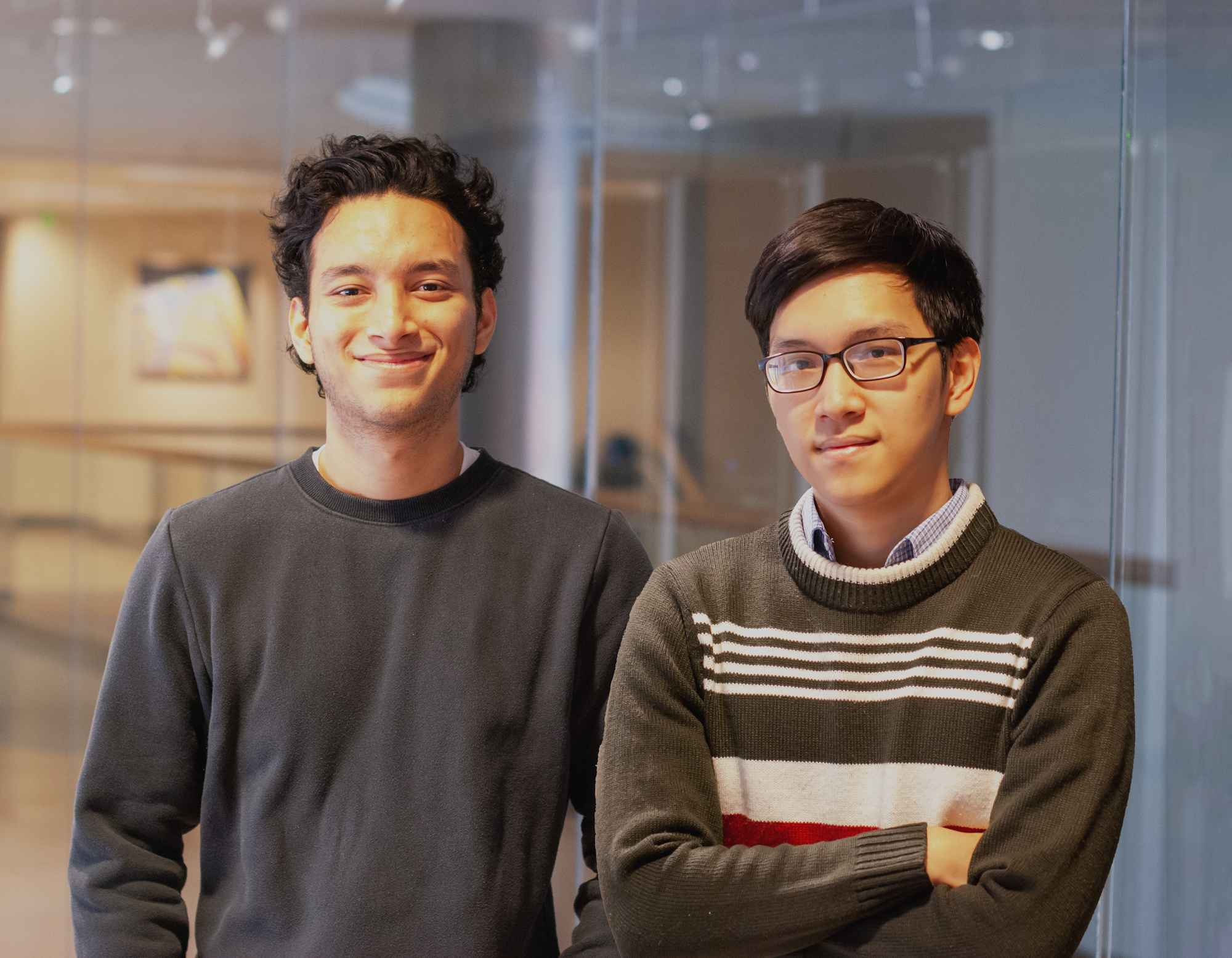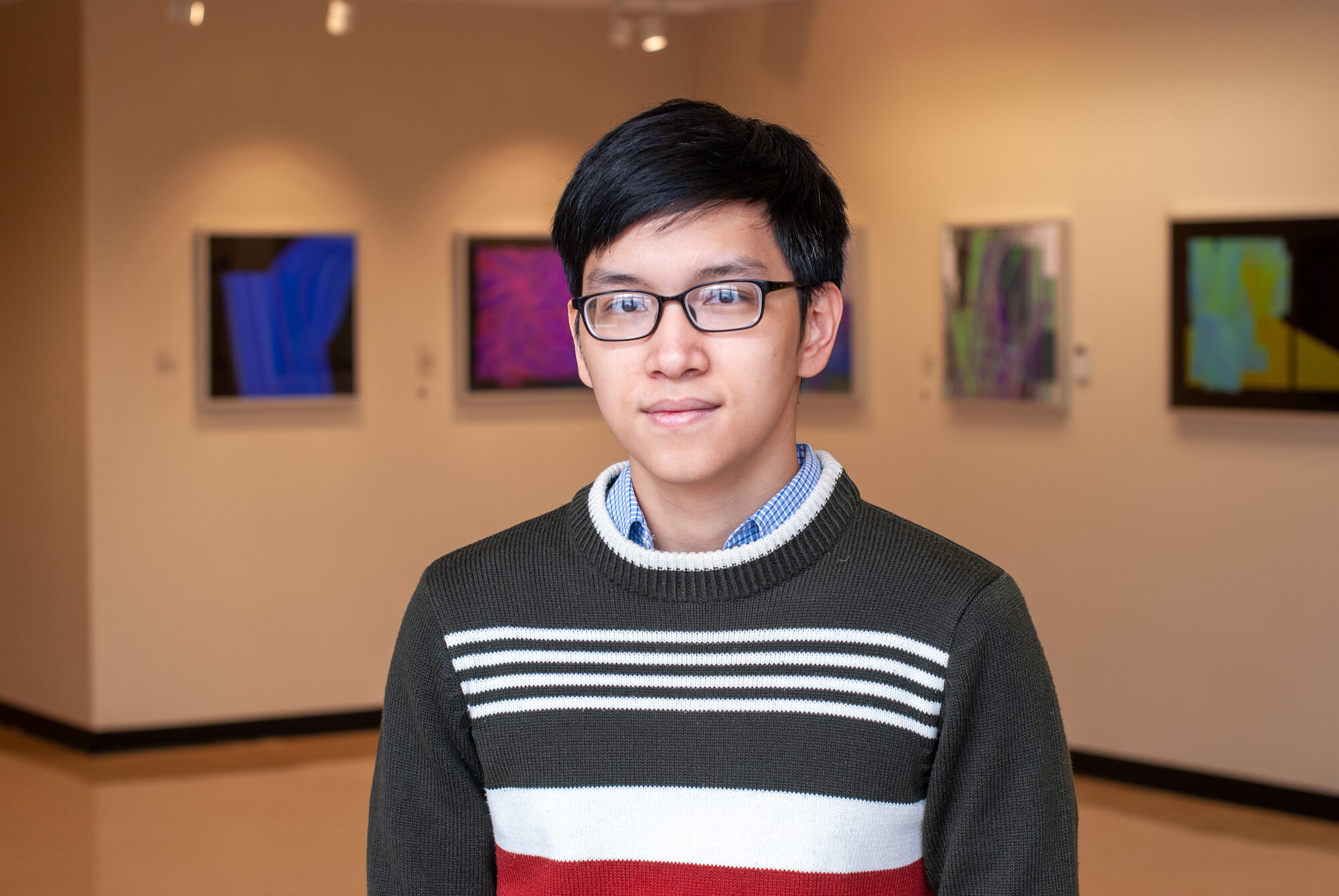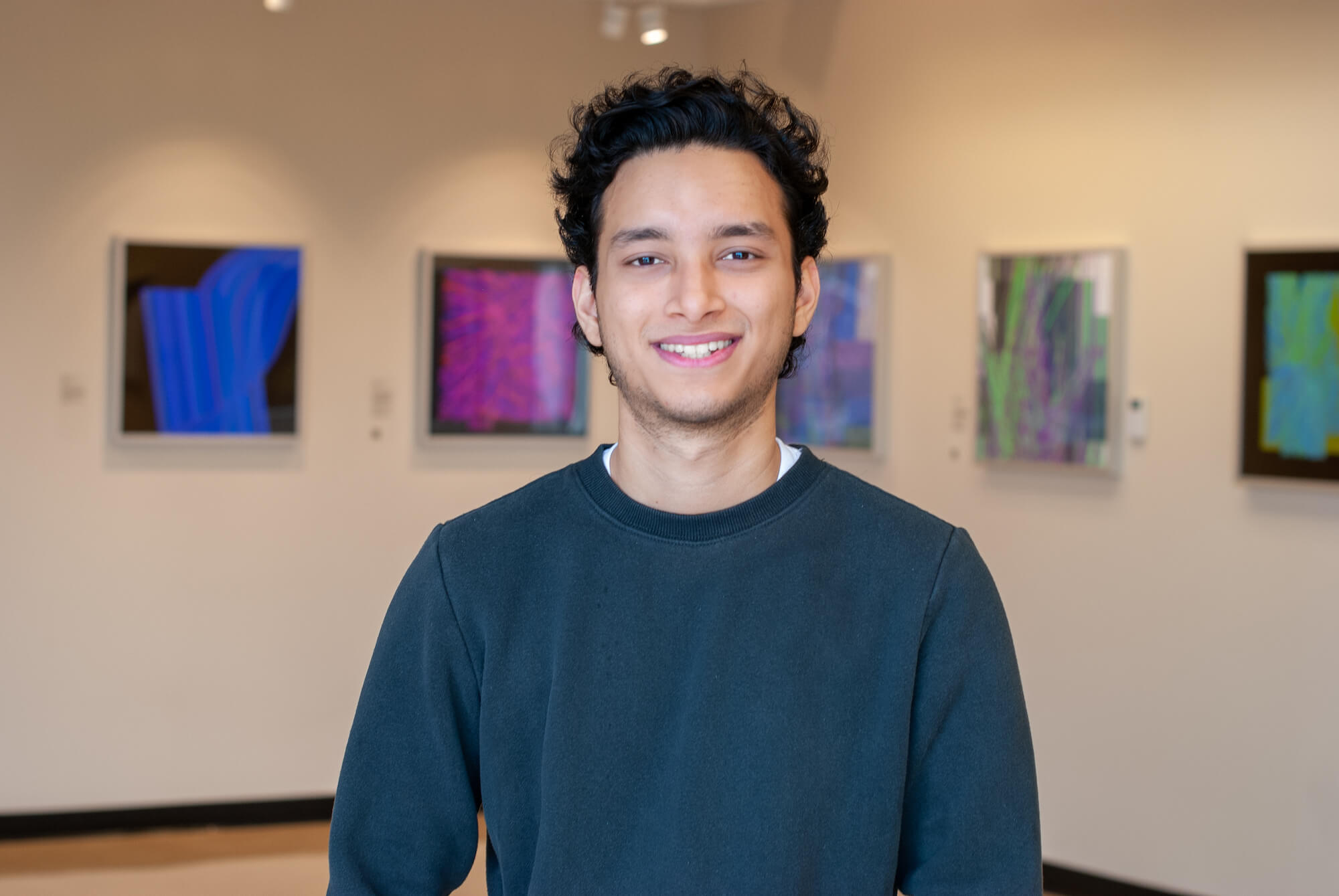Purdue CS undergrads earn honorable recognition in CRA Outstanding Undergraduate Researcher Competition
02-26-2023

Shreyas Kharbanda and Trung Dang are undergraduate researchers who received an honorable recognition from the CRA for the 2023 Outstanding Undergraduate Researcher competition.
Two computer science majors were recognized by the Computing Research Association (CRA), both receiving an honorable recognition in the 2023 Outstanding Undergraduate Researcher competition.
Trung Dang and Shreyas Kharbanda pursued research as undergraduates in distinct areas. Dang in theoretical computer science and Kharbanda in distributed systems. Both brought with them the innovation and creativity that is part of their persistent pursuit to solve complex challenges in any field.
Their efforts earned both computer science majors an honorable recognition in the 2023 Computing Research Association (CRA) Outstanding Undergraduate Researcher competition. The award recognizes students in North American universities who show outstanding potential in an area of computing research.
Theoretical research
Trung Dang is a senior majoring in computer science in both the foundations and machine intelligence tracks. His interests are in theoretical computer science, specifically at the intersection of computer science and economics. This includes algorithmic mechanism design, fair allocation, algorithms under uncertainty, sublinear algorithms, combinatorial algorithms, and statistics.

“I have been working on designing and analyzing optimal algorithms in auction settings with incredibly limited information,” said Dang. He added, “This problem model captures many real-life issues and has many applications.
Dang describes an example, in the context of online ad auctions.
“One can think of each real value as the unknown probability as a user clicks on an ad and the estimate as a machine learning prediction,” he said. Dang added, “Our goal is to choose the most rewarding advertiser.”
For his part, Dang showed that a class of algorithms that have been proposed before in the literature is surprisingly non-optimal. This motivated Dang and his fellow researchers to design a learning algorithm that extracts distributional information about the items and uses this information to predict the best item in all instances.
Dang’s favorite part of his academic undergraduate experience at Purdue has been the opportunity to collaborate with a diverse group of people to tackle real-world problems.
“I really enjoy the collaborative environment at Purdue CS. I have been incredibly fortunate to be teamed up with people with different backgrounds and expertise,” said Dang. “Whether it’s research-targeted or class-related, the group work gave me a lot of experience of working with others and allowed me to learn and explore many distinct subfields of computer science.”
"I am indebted to the professors who mentored me through my undergraduate research. I’ve been fortunate to have worked with Professors Alex Psomas, Paul Valiant, and Ninghui Li at Purdue.”
Connecting research
How does theoretical computer science affect daily lives? Dang confides that because his area of research is theoretical it’s possible people outside of the profession might not immediately see the impact. He offers assurance that many of the results from theory research can provide a profound impact in real life. Designing algorithms under uncertainty captures many stochastic processes in real life such as job applications, ad auctions, house selling, and countless other useful applications.
“One aspect of my area of research offers benefits to big tech companies,” said Dang. He added, “An example is Google, they are using results from auction design theory to fine-tune their ad auto-bidding system which generates billions of dollars in advertising revenue every year. Additionally, in non-profit settings, results from mechanism design helps match patients with kidney diseases with compatible kidney donors around the world.”
Algorithmic Programming
Dang is a member of Purdue’s Algorithmic Programming team. He and his teammates have ranked consistently in the ICPC North America Championship, peaking at fourth place in 2020 and consequently bringing Purdue to ICPC World Finals for the last three years.
“Competitive programming is how I realized I had a love for algorithmic design,” said Dang. He added, “Because of those experiences, I know there is a need for better algorithms, which is my drive for doing research in theoretical computer science.”
Paper
- Zitao Li, Trung Dang, Tianhao Wang, and Ninghui Li. 2021. MGD: A Utility Metric for Private Data Publication. In Proceedings of the 8th International Conference on Networking, Systems and Security (NSysS '21). Association for Computing Machinery, New York, NY, USA, 106–119. https://doi.org/10.1145/3491371.3491385
Systems Research
Shreyas Kharbanda is a senior majoring in computer science in the systems software track. His area of research is in distributed systems. His experience involves the performance of high-level language runtimes and knowledge aggregation across nodes to increase the efficiency of generating execution traces in serverless environments.

“I got into systems research because I had a passion for understanding the fundamental workings of computer systems,” said Kharbanda. He added, “After taking the operating systems course, I realized I wanted to dive deeper into the world of computer systems and explore the field of research.”
Kharbanda was particularly drawn to working with Professor Pedro Fonseca, due to his area of research in reliable and secure systems.
“I feel fortunate to have him as a mentor,” said Kharbanda. He added, “Under Professor Fonseca’s supervision, I am working on enhancing the efficiency and usability of serverless platforms.”
Steep learning curve
When Kharbanda began his academic journey at Purdue University, he had little background in coding or in the field of computer science. He remembers the core courses presented a steep learning curve that eventually became incredibly rewarding.
“The core courses instilled in me the determination to push through difficulties I had,” said Kharbanda. He added, “I came out on the other side with a deeper understanding of the subject. The core courses were difficult, but they have ultimately prepared me for my next step in my academic and professional journey.”
Pride in the pursuit
Working hard to succeed in classes and research, Kharbanda has many accomplishments. As an undergraduate teaching assistant (UTA), Kharbanda co-led programming labs for more than 250 students throughout the semester.
“I’m proud of the many accomplishments I’ve had at Purdue,” said Kharbanda. First on the list has been working as an UTA for CS 240 - Programming in C.”
“While many students I tutored, saw low-level computing as an archaic and intellectually challenging subject, I saw an opportunity to use my knowledge and love for systems to help students get excited about learning these concepts,” said Kharbanda.
For each lab, Kharbanda would preface a concept and peel back its layers to show the students the abstractions that it made possible.
Kharbanda said, “When talking about binary dumps in C, I showed students how they could use the code they were writing as tools that would enable them to work with data files in environments lacking storage capacity, like embedded systems.”
Community at Purdue
When Kharbanda came to Purdue he found an encouraging environment to study and pursue his interests.
“The immense support and encouragement I have received to explore and cultivate my academic interests is one of the things I’m most thankful for,” said Kharbanda. He added, “This supportive environment has encouraged me to take risks, think outside the box, and pursue my passion with confidence.
Computer science can benefit everything and everyone
In relating his work to common benefits and everyday life, Kharbanda likes to think that any career or area has a potential relationship to computer science.
“One of the most amazing things about computer science is that it offers endless opportunities for people to make a positive impact in areas that they care about,” said Kharbanda. He added, “From healthcare to climate change to education, the tools and methods of computer science can be applied to almost any field to solve problems and drive progress.
About the Department of Computer Science at Purdue University
Founded in 1962, the Department of Computer Science was created to be an innovative base of knowledge in the emerging field of computing as the first degree-awarding program in the United States. The department continues to advance the computer science industry through research. US News & Reports ranks Purdue CS #20 and #16 overall in graduate and undergraduate programs respectively, seventh in cybersecurity, 10th in software engineering, 13th in programming languages, data analytics, and computer systems, and 19th in artificial intelligence. Graduates of the program are able to solve complex and challenging problems in many fields. Our consistent success in an ever-changing landscape is reflected in the record undergraduate enrollment, increased faculty hiring, innovative research projects, and the creation of new academic programs. The increasing centrality of computer science in academic disciplines and society, and new research activities - centered around data science, artificial intelligence, programming languages, theoretical computer science, machine learning, and cybersecurity - are the future focus of the department. cs.purdue.edu
Writer: Emily Kinsell, emily@purdue.edu
Sources: Trung Dang, dang28@purdue.edu
Shreyas Kharbanda, skharban@purdue.edu